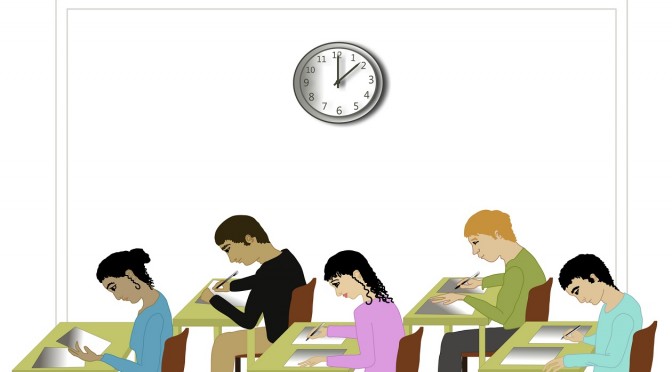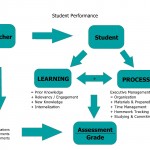 So what is a parent supposed to do?
So what is a parent supposed to do?
You get in their face too much, and it’s “Back off!” You back off, and they do everything but what you want ’em to do. There’s no better way to go crazy than to be a parent. I know, I’ve gone crazy twice. Well, make that three times, since I was a kid once, too, and the only way to go crazier than by being a parent is by being a child.
To be the perfect parent is impossible. Kids disagree, because they’re always full of advice on how we could be doing our jobs better as their parent. And, of course, the perfect child doesn’t exist either. And here is a real problem: when kids assume they can’t please us, they just drop all of our expectations. Some call it “rebellion.” When it comes to school, we call it “trouble.”
Then we get angry parents
Think about how quickly your child runs home with a good grade on a test, waving it in front of you, demanding your congratulations and praise. Of course they do, because they know you’ll be so happy with them.
Then think about how they defer, hide, and try to get away with not showing you the low grades. They do it because they think you’ll get mad at them, and they’d rather not deal with that. You know, yelling and grounding and the like. Much easier to put off your anger for later than deal with it now. Deferment of pain is a natural and rational human choice.
But what kids don’t get is that that’s not what’s really going on. Sure, you’re going to get mad, and, yes, yelling and grounding may follow. But it’s not because of the low grades. You’re angry because you’re worried. Kids don’t realize this. They just think you’re mad because you’re like that.
Kids want to please parents
Kids want to please their parents. They want to meet parent expectations and to be that perfect child they know they’re parents want them to be. Reality gets in the way, and disappointment and anger may follow. But it doesn’t have to go that way, and real trouble can result if we parents don’t handle it well ourselves.
When I work with students, I ask them why they don’t tell their parents about the bad grades at school. It’s always, “because they’ll get mad.” Okay, I say, but you know they’re going to see it eventually and then get even more angry. No answer. Now, do you show your parents the good grades? “Sure.” Why? Smiling now, “It’ll make ’em happy.”
Parents don’t get angry with the low grades. It’s the impact of those grades that scares parents into anger. And when kids bring good grades, it’s not the grades we parents applaud, it’s our joy at a bright future for our children that those grades represent that makes us happy.
Children are deathly afraid to disappoint their parents, and they will make up all kinds of excuses for negative outcomes. If you listen carefully, all of those excuses are designed to deny having disappointed parents: it’s always someone or something else’s fault. And in the face of parental anger, kids then further excuse themselves from having caused that anger by blaming it on the parents’ own anger. Yes, there is a logic to it, however unproductive it may be.
Parents are motivated by fear
Kids readily perceive parental anger over bad news but not the love that stands behind it.
We parents are afraid for our children, and we see danger at every turn. When they were little and starting to walk, everyday objects around the house were like daggers poised to kill our precious children. So we padded the sharp corners of the table, put those stupid plastic covers into the outlets, and blocked off the stairs. As children grow older, our fears turn to new dangers, also very real, such as popular culture, the internet, drugs and alcohol, teen driving, and, of course grades.
Children don’t get that our fears are motivated by love. When I ask kids if their parents would get angry if they didn’t love them, they go blank. Of course not, since if they didn’t love they wouldn’t care. It is helpful for kids, at least conceptually, to know that parental anger over poor grades is an act of love. We parents need to remind them of it, especially when we are angry.
Helicoptering & other forms of oversight
Sometimes I hear about the old school, hard-knocks way of parenting: let ’em fall, brush off, and get back up again on their own. There’s a lot to be said for this, as it develops independence and ownership of outcomes by children. But it doesn’t always work, and how can it truly work all the time? Kids do need help sometimes.
We also hear about the “helicopter” parent who hovers over every little thing the child does, making sure it’s all perfect. The danger here, of course, is the opposite of the “hard knocks” school of parenting in that the child will never develop independence and ownership of outcomes. Plus, sometimes that helicopter runs out of gas, and then what? You can’t be on top of everything that goes on in your child’s life.
So the question is balance: what can we do for our children that is productive, healthy, and promotes the values and independence and ownership of them we want out of our children?
Honesty, Love, and Trust
But verify.
Honesty is a two-way street, and when that traffic is coming at you hard, it’s easy just do dodge it with a little lie. But we must face things as honestly as possible, for without honesty we can never fully trust. It’s most difficult for kids to be honest with their parents, because they don’t want to disappoint them. The best we can do as parents is to remind our kids what our expectations are and how they are built from love and not anger. Let our children know it’s okay not to be perfect, but remind them of the values and hopes we hold for them.
This is really hard to do, and no parent can every fully reach it. So we must also verify.
Help when needed
I can’t tell you how many times we hear from parents, “He always says he did his homework already. How am I supposed to know?”
When it comes to schoolwork and grades, schools are supposed to assist parents with timely assignment and grade notifications and communication between teachers and parents. It is impossible, of course, to know everything all the time. (My mother had me convinced that she was “the fly on the wall” in my elementary school.) Ideally, the information flow is sufficient for parents to know what teacher expectations are so as to be able to verify workflow with their child. Worse, however, in the schools we have seen in our student support service, effective teacher feedback is not the norm.
Well, when the grades come back you’ll know for sure.
Until then, the question is if the child is deferring responsibility or actually fulfilling it. In our student support service, our ideal is for students to account for themselves without parent or teacher oversight, and we provide the HomeworkTracker to our clients as an effective tool for it. But we’re not always working with kids who have that ability to be on top of everything all the time, so more tools are needed. We support parents and students by monitoring their teacher pages and progress reports and encouraging teachers to provide direct feedback for our students.
The most powerful tool we provide, however, is a simple, honest conversation. And an ongoing one. We speak with our students at least once a week in order to help them think through what’s going on in school, verify what we see, and to problem solve. The very first and the most powerful thing we can do with a student is to help them remove those self-imposed barriers that they use as easy excuses for not meeting their parents’ and their own goals. Once a student articulates a goal honestly (a goal to get all A’s is less honest than a goal to improve on existing C’s and D’s), then those self-imposed barriers becomes problems to solve rather than excuses.
It is a huge the first step for students who have been in the process of denial and deferring to be honest and realistic with themselves. When parents and students are in a cycle of denial and anger, that honesty is difficult to find. Some of the greatest successes in our service have been to restore that trust between parents and students over school work. Then they can argue over more important things, like chores and what movies they’re allowed to see. Getting there takes patience, consistency, honesty and love. We’re one tool available to parents and students to get there.
In an upcoming post, I will cover the feedback process more carefully and offer some suggestions for parents and teachers on how to up that game. Meanwhile, we wish students and parents all a happy, positive start on the new school year!
– Michael
The A+ Club from School4Schools.com LLC, based in Arlington, VA, is dedicated to helping students across the U.S.A. meet their goals and find the academic success the want and deserve. Contact us here or call now to (703) 271-5334 to see how we can help.
 When a parent of a middle or high school teen worries that “my student doesn’t test” well, what’s missing is a combination of goal setting, preparation and execution.
When a parent of a middle or high school teen worries that “my student doesn’t test” well, what’s missing is a combination of goal setting, preparation and execution.

 Parents concerned about their teen’s middle and high school exam and test prep might consider that studying isn’t just a matter of reviewing notes and study guides. Successful testing requires ongoing learning.
Parents concerned about their teen’s middle and high school exam and test prep might consider that studying isn’t just a matter of reviewing notes and study guides. Successful testing requires ongoing learning.
 For successful testing, students need to know what will be on the test. Sounds obvious, but parents don’t want to hear from their teens that there were “surprises” on a test or that they studied for the wrong thing.
For successful testing, students need to know what will be on the test. Sounds obvious, but parents don’t want to hear from their teens that there were “surprises” on a test or that they studied for the wrong thing.
 We often hear from parents that “my child doesn’t test well.”
We often hear from parents that “my child doesn’t test well.”









